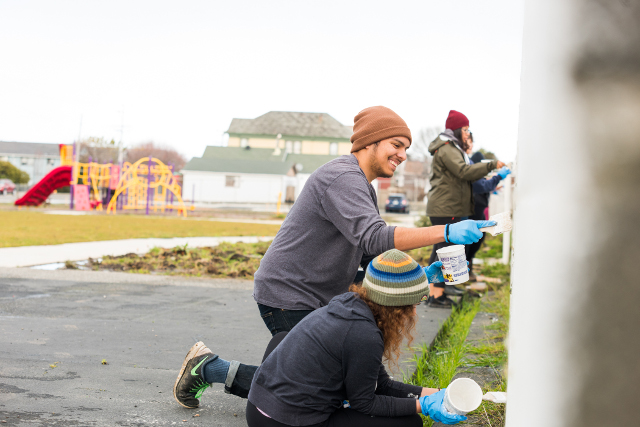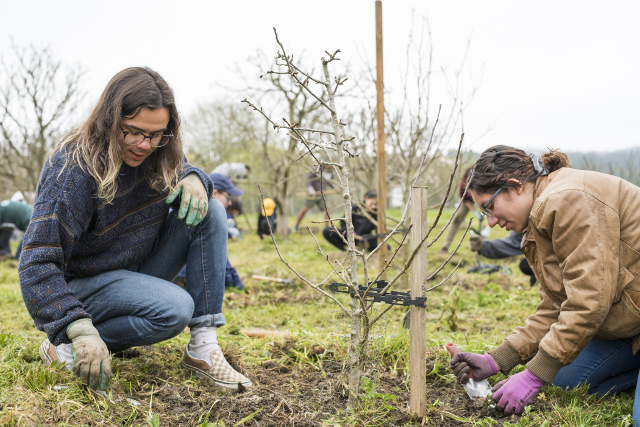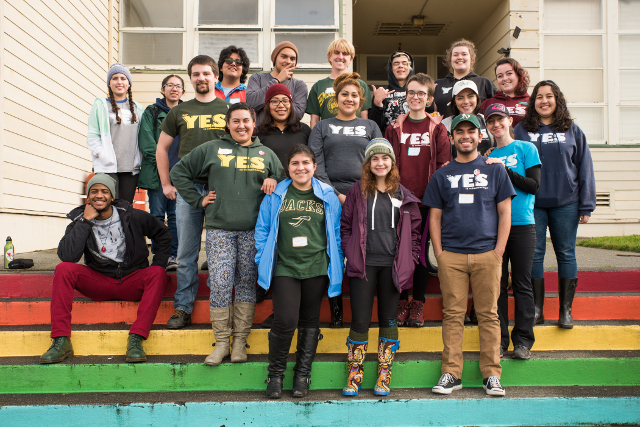
To celebrate and reflect on the program’s growth and successes, Y.E.S., in collaboration with the HSU Library, is publishing a book and hosting a pair of events in the fall.
In 1968, Humboldt State University students John Woolley (who would go on to become a Humboldt County supervisor) and others launched a program to help local youth with their studies.
Today, that program is called “Study Buddies,” and it’s the oldest of 14 programs that comprise Y.E.S., addressing a variety of community issues. Students involved with Y.E.S. (the volunteers, program directors, and program consultants are all students) gain experience working with the youth and elderly, engaging with children and individuals experiencing homelessness, establishing relationships with youth in juvenile hall, connecting Spanish and English speaking communities, and more.
Y.E.S. coordinator Melea Smith says talking to Y.E.S. alumni, former staff and community partners as part of the anniversary project has been inspiring.
“They shared how impactful experiential learning has been in their personal and professional lives,” Smith says. “They remembered bonding with other students and staff during Y.E.S. retreats, workshops, and social gatherings. And they all mentioned the relationships they built with participants in the local community. For me, this was a wonderful reminder about the importance of supporting new student proposals and partnerships, while maintaining the longstanding Y.E.S. traditions that continue to mean so much.”
Annie Bolick-Floss (’78, Interdisciplinary Studies, ’95, M.A. Social Sciences) became the Y.E.S. Executive Director/Service Learning Coordinator in 1994, after 13 years of work in local nonprofits. When Bolick-Floss started, Y.E.S. was primarily funded by Associated Students and grants with some support from United Way.
Y.E.S. received more support when Gov. Gray Davis and the legislature gave the California State University system $2.2 million to implement or expand service learning in 2000. Becoming the largest higher education institution to offer those programs, the CSU committed to matching the state funds with at least $2 million from other sources.
Since then, the CSU’s Call to Service Initiative has received more than $20 million to help develop new service-learning courses or expand service-learning offices on all 23 CSU campuses.
“HSU and Y.E.S. were seen as leaders specifically around student leadership,” Bolick-Floss says. Along with several other campuses that had student-initiated service learning programs, Y.E.S. was tapped as a template for other CSUs to launch similar efforts.

One of the biggest reasons for the success of Y.E.S., Bolick-Floss says, is that the programs are all started and led by students.
“Change is inevitable,” says lead program consultant Dean Shearer. “Y.E.S. is adaptable. In my time at Y.E.S., one program ended and a new one started.”
Shearer, a wildlife senior, got involved with Y.E.S. his freshman year after seeing a poster for Leadership Education Adventure Program (LEAP), which engages youth from low-income backgrounds with the outdoors while building self-esteem and leadership skills.
“Taking kids rock climbing sounded cool,” he says. In his second year he became LEAP’s program director, overseeing and managing the student volunteers and the events and activities. Now, as program consultant, he works to support the directors of all Y.E.S. programs. In that time he’s learned about nonviolence, problem solving, communication, equity and more.
Adaptation and student leadership are important, he says, because programs change to suit the interests of students in Y.E.S. and issues and needs in the community.
“Students have an incredibly huge impact on what the organization does and looks like,” he says. “Y.E.S. will likely be a reflection of the students and campus community in the next 50 years.”
Oliver Winfield-Perez, Y.E.S. program consultant and critical race, gender and sexuality studies TKTK senior, also got his start with Y.E.S. during freshman year when he met a group of students tabling for the Queer Mentoring and Advocacy Program (QMAP).
“As a new person to the school and a queer person I got really excited about it, I thought ‘maybe this is my space,’” he says. “I went to meetings and felt at home right away.”
One of the newest programs to Y.E.S., QMAP focuses on support, empowerment, advocacy, mentorship, and creating safe spaces for queer people in Humboldt County. The student volunteers work with high schools and teen centers around the community.
Winfield-Perez says Y.E.S. has begun to look more critically at its role in the community in recent years, trying to approach its programs from less of a “savior mentality.”
“We want to create a narrative where Y.E.S. is here to support needs in the community, but also here to learn and collaborate,” he says. That means students recognizing their abilities to help their community, but also understanding it.
“We know what we, as students, need but have less understanding about the experiences of someone who’s lived here 50 years, or a student of color in a local elementary school,” he says. “We all have really different experiences and need to be conscious of our own experiences and others’ experiences. We have to listen and not push what we think they need.”

Y.E.S. relies closely on community partnerships, collaborating with Potawot Community Food Garden, the Jefferson Community Center, elementary and high schools, and many more. Other local organizations began as Y.E.S. projects, including the Campus Center for Appropriate Technology (CCAT).
“Y.E.S. as a whole has really worked hard to be the best that we can be in the community,” says Amanda Ramirez-Sebree, a Y.E.S. program consultant and Environmental Science & Management senior. In her time at Y.E.S. she’s worked with the Study Buddies and Juvenile Hall Recreation programs, among others.
This year, she’s been tasked with poring through Y.E.S. and HSU Library archives to pull historic materials for the 50th anniversary, as well as lead outreach for the anniversary publications and celebrations.
Another critical part of the success of Y.E.S. and its alumni is its solid partnerships and relationships in the community, says Bolick-Floss. Students who’ve worked with Y.E.S. have gone on to create and work in successful community organizations.
“Working with community partners give students interactions to learn from professionals as well as network with potential employers and get references for future careers and opportunities,” says Bolick-Floss.
Smith says she expects Y.E.S. will continue to adapt and grow.
“Y.E.S. students are engaged in hands-on learning with a commitment to social justice, community partnerships, and creating a positive change,” she says. “Many students have shared that they find community and a sense of belonging at Y.E.S.”
Student leaders agree. “Y.E.S. is more like a home,” Shearer says. “People come hang out, do homework, eat, talk with people. It’s a community space on campus.”
“Everything I’ve learned from Y.E.S. is always going to follow me wherever I go,” says Winfield-Perez. “Y.E.S. grounded and supported me in who I am today. I’ll always hold Y.E.S. close to my heart.”
Y.E.S. 50th Anniversary Events and Projects:
Reception
Friday, Oct. 5, 5:30-7:30 p.m.
Goodwin Forum
Volunteer Project
Saturday, Oct. 6, time TBD
Potawot Community Food Garden, Arcata
Volunteers will be greeted by community partners who will discuss the founding of the Potawot Community Food Garden and the mission of the United Indian Health Services organization. Various gardening projects may include harvesting and tending strawberry beds, orchard care, native herb garden (harvesting and tending), mulching, greenhouse care, etc.
Publication & Library Internships
The library will hire several student interns to help create a book/publication to commemorate the Y.E.S. 50th anniversary. This project aims to tell the history of Y.E.S., spanning 50 years of engagement, through archival images and interviews.